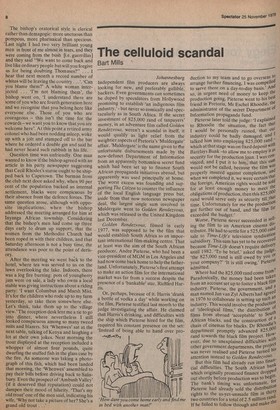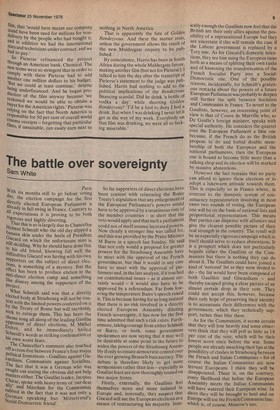The celluloid scandal
Bart Mills
Johannesburg Independent film producers are always looking for new, and preferably gullible, backers. Even governments can sometimes be duped by speculators from Hollywood promising to establish 'an indigenous film industry,' but never so comically and spectacularly as in South Africa. If the secret investment of 825,000 rand of taxpayers' money, in an adventure film called Golden Rendezvous, weren't a scandal in itself, it would qualify as light relief from the weightier aspects of Pretoria's 'Muldergate' affair. 'Muldergate' is the name given to the unfortunate disbursements made by the now-defunct Department of Information from an apparently bottomless secret fund which had been set up to finance South African propaganda initiatives abroad, but apparently was used principally at home. The worst excess was founding and supporting The Citizen to counter the influence of the local English language press but, aside from that now notorious newspaper deal, the largest single sum involved in Muldergate went to Golden Rendezvous, which was released in the United Kingdom last December.
Golden Rendezvous, filmed in early 1977, was supposed to be the film that would establish South Africa as an important international film-making centre. That at least was the aim of the South African producer, Andre Pieterse, who had been a vice-president of MGM in Los Angeles and had now come back home to help the fatherland. Unfortunately, Pieterse's first attempt to make an action film for the international market was far from a success despite the presence of a 'bankable' star, Rich-ard Harris.
Or, perhaps, because of it. Harris 'drank a bottle of vodka a day' while working on the film, Pieterse testified last month to the judge investigating the affair. He claimed that Harris's drinking, and difficulties with the ship which Pieterse hired for the film, required his constant presence on the set: 'Instead of being able to hand over pro duction to my team and to go overseas t° arrange further financing, I was compelled to serve there on a day-to-day basis.' Ad so, in urgent need of money to keep the production going, Pieterse went to his best friend in Pretoria, Mr Eschel Rhoodie, the administrator of the secret Department 0.` Information propaganda fund. Pieterse later told the judge: 'I explained to Rhoodie the situation, the fact the I would be personally ruined, that 00,t industry could be badly damaged, and talked him into employing 825,000 rand which at that stage was on fixed deposit with Barclays Bank —to allow me to employ it as security for the production loan. I was CO vinced, and I put it to him, that this suin would not be called, because the film wads properly insured against completion, an when we completed it, we were certain tit the foreign, American rights would be sow for at least enough money to meet th„,e obligations of production, then this 825,0°u. rand would serve only as security till_thai time. Unfortunately for me the production got further out of hand, and the film fat. exceeded the budget.' Worse, Pieterse never succeeded in seo. ing the film to an American cinema dis; tributor. He had to settle for a 525,000 rano sale to Time-Life's television syndication, subsidiary. This sum has yet to be recover° because Time-Life doesn't require deliver)/ until 1982. 'To be brief,' asked the judge; 'the 825,000 rand is still owed by you your company?' It is still owing,' pieter admitted.
the 825,000 rand come fro°'; paradoxically, d Wm it eercle the money had been take' from an account set up to foster a black filni industry. Pieterse, the government, all man named Jan van Zyl Alberts had agree° in 1976 to collaborate in setting up such an industry. This would involve the production of ideological films,' the distribution °t films from abroad 'acceptable to Soutn African blacks, and the construction chain of cinemas for blacks. Dr Rhoodieos department promptly advanced 825,0° rand towards the black film project. flow,ever, due to unexplained difficulties wit': other government departments, the projec: was never realised and Pieterse turned bis attention instead to Golden Rendezvous. But this film had already run into finall; cial difficulties. The South African balls; which originally promised finance dropP" out shortly before production was to begin' The bank's timing was unfortunate, frir Pieterse had already sold the distributi° rights to the as-yet-unmade film M thirty two countries for a total of 2.5 million ranet.: If he failed to follow through and make tit` film, that 'would have meant our company could have been sued for millions for nondelivery by the people who had bought it, and in addition we had the international stars and technicians under contract, and we had to pay., So Pieterse refinanced the project through an American bank, Chemical. The new terms were so stringent that in order to comply with them Pieterse had to add another one million dollars to his budget. But we could at least continue,' despite being underfinanced. And he began production of the film anyway because 'we reckoned we would be able to obtain a buyer for the American rights.' Pieterse was relying on the fact that North America is responsible for 50 per cent of overall world cinema receipts — forgetting that particular lints, if unsuitable, can easily earn next to nothing in North America. That is apparently the fate of Golden Rendezvous. And there the matter rests, unless the government allows the result of the new Muldergate enquiry to be published.
By coincidence, Harris has been in South Africa during the whole Muldergate furore, making another film (but not for Pieterse). talked to him the day after the transcript of Pieterse's statement to the judge was published. Harris had nothing to add to the political implications of the Rendezvous financing scandal. Did he drink 'a bottle of vodka a day' while shooting Golden Rendezvous? 'I'd be a fool to deny I had a drink. But when I was drinking! never let it get in the way of my work. Everybody on that film was drinking, we were all so fucking miserable.'



































 Previous page
Previous page